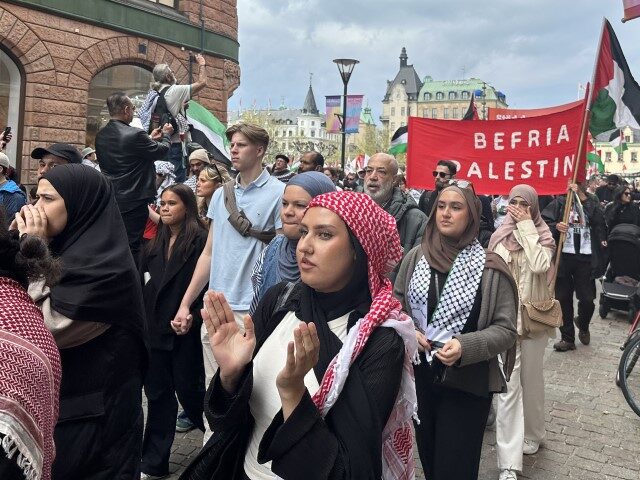The increasingly dwindling Jewish community of Malmö, Sweden – a city that has developed a reputation for being a hub of Islamist antisemitism in the past decade – fears targeted attacks this week as their home hosts the Eurovision Song Contest, attracting massive pro-Palestinian mobilizations.
Jewish residents told the German newspaper Die Welt they feel they are “not welcome in [their] own city” and that many have chosen to simply leave town while the contest is going on.
“There is a general feeling of uncertainty. You have the feeling that you are not welcome in your own city,” Daniel Janouch, chairman of the Jewish Youth Association, told the German newspaper. “I know several Jews who want to leave Malmö during the ESC.”
Die Welt noted that Jews throughout Sweden are increasingly afraid of appearing visibly Jewish as the rising population of Muslim migrants in the country has corresponded to skyrocketing rates of antisemitic activity.
“In a survey by the Central Council of Jews in Sweden, three out of four respondents said they were afraid of openly bearing Jewish symbols,” Die Welt reported. “One in two thinks about leaving the country.”
The Eurovision Song Contest is an annual event in which participants – this year, 37 countries, including Israel – send an artist to perform an original song. The best performance, as chosen by a mix of popular vote throughout the participating nations and a panel of elite judges, wins, and that country hosts the next year’s tournament. Sweden is the winningest country in the half-century-old tournament, along with Ireland, both of which have won seven times.
This year marks the 50th anniversary of Sweden’s 1974 victory in the contest, with the international hit “Waterloo” by Abba.
Israel’s participation has for years been controversial given rising antisemitism in Europe generally. This year, the anti-Israel movement, galvanized by the atrocities of Hamas’s October 7 terrorist siege of the country, has made anger at the country’s presence in the song contest even louder. Hamas terrorists slaughtering 1,200 people, including children as young as infants, on October 7 prompted international leftists and jihadist groups to condemn Israel for attempts to neutralize the Iran-backed jihadists and prevent a repeat of the massacre.
In April, the Israeli television network Channel 12 sent journalists to Malmö to gauge public sentiment prior to Eurovision. The journalists, Ohad Hemo and Elad Simchayoff, discovered widespread support for Hamas, including denials of the atrocities committed on October 7, and faced physical and verbal abuse at the hands of locals identifying them as Israeli.
“Monkey and pigs have more respect than they do. Pigs are much better than Jews. If it were up to me, there would be no Jews left on this earth,” one local told the network.
“I hope they kill you all,” another local shouted as a group of members of the Muslim community of Malmö spat at and threatened the journalists.
Swedish officials have admitted to increased rates of jihadist activity, antisemitism, and other problems stemming from the creation of “parallel societies” in the country led by radical imams and other Islamist figures. As a result, the Jewish population has declined. Die Welt noted that the Jewish population of Malmö today is about half of what it was in the 1970s, a mere 1,500 people. Malmö has seen massive anti-Israel protests all week, which authorities expect to grow larger on Thursday, when Israel takes the stage for the semifinals of the contest, and potentially on Saturday if Israel makes it to the Grand Final.
The Swedish government has rejected pressure to choose another location for the contest. The organizers of Eurovision, the European Broadcasting Union (EBU), have also refused pressure to oust Israel from the contest – though they did demand Israel’s performer, Eden Golan, change the lyrics of her song to be less “political.” The song, initially called “October Rain,” paid homage to the victims of Hamas. The song is now called “Hurricane” and contains many of the original lyrics, but not those honoring the children slain by the jihadists: “they were all good children, each one of them.”
The EBU also issued a message reminding participants that the display of the Palestinian flag was not allowed, as it does not represent a country participating in the event. The only non-country flags allowed at Eurovision are the LGBTQIAP2S+ flags.
“The ESC is a non-political event,” the official contest rules read. “All Participating Broadcasters, including the Host Broadcaster, shall be responsible … to make sure that the ESC shall in no case be politicized and/or instrumentalized and/or otherwise brought into disrepute in any way.”
Israel has also refused to back out of the tournament, though Israeli security officials have urged their citizens to avoid Malmö during the tournament.
Golan herself has reportedly been forced largely into confinement in her hotel room out of fear of attacks against her person. The Times of Israel reported on Tuesday that the head of Shin Bet, Israel’s top security agency, visited Malmö a week before the tournament to help arrange security for the Israeli delegation to Eurovision.
Golan is expected to take the stage and perform “Hurricane” on Thursday.

COMMENTS
Please let us know if you're having issues with commenting.